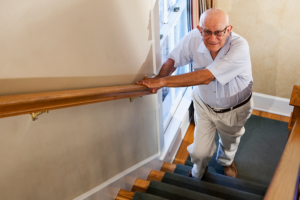Watch for These Signs That Could Point to Mobility Issues in Seniors

Learn the signs of mobility issues in seniors.
Benjamin Franklin was definitely right: An ounce of prevention is really worth a pound of cure. When it comes to detecting and addressing mobility issues in seniors, prevention is a must. Falls in seniors lead to 3 million emergency room visits, 300,000 hip fractures, and 32,000 deaths each year, according to the CDC.
Avoid a tragedy in the future by looking out for these warning signs of increasing mobility issues in seniors:
- Experiencing dizziness. Dizziness and problems with balance can arise from a plethora of factors that ultimately cause difficulty with mobility. It’s important to learn why these issues are taking place and address them right away.
- Struggling to sit or stand. Notice whether the senior finds it hard to either stand up from a seated position or to sit back down. Do they require something to hold onto for support?
- Skipping physical activity. Another warning sign is a senior loved one who previously participated in some degree of exercise but now is choosing a more sedentary lifestyle. Exhaustion or weakness can result in problems with mobility.
- Steering clear of stairs. An older adult who seems to be getting around just fine but is avoiding going up or down stairs may be fearful of falling because of mobility changes.
One simple and effective option to determine mobility and fall risk in older adults is the TUG (Timed Up and Go) test. The test should be performed on a regular basis. Here is all it will require:
- Place a stable chair against the wall.
- Mark a distance of 10’ from the wall.
- Have the senior sit in the chair.
- When you tell them to go, start a timer, and have the person stand, walk towards the ten foot mark, turn around, come back and sit down again.
Be sure to stand close by the senior as they perform the test in case they need extra support. Track the outcome over a period of time and share with the person’s doctor for guidance. Find more information about the test as well as a downloadable one-page evaluation sheet here.
If you note any signs of mobility issues in seniors, it is time to start the appropriate conversation with the senior about getting help. Let the person know you’re concerned, and schedule an appointment for a check-up with the physician. The implementation of some simple mobility aids might make an enormous amount of difference in maintaining safety and independence.
Reach out to Responsive Home Care for additional fall prevention strategies for older adults, and also to learn about the countless ways our respite care in Weston, FL and the nearby areas can improve quality of life for a senior you love.
